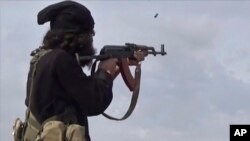Suspected Islamic State militants attacked a bus carrying soldiers in the eastern Syrian province of Deir al-Zour, killing over 20 people and wounding others, state media and a war monitor group reported.
The late Thursday attack took place in the southeastern part of the restive province, according to Syria’s official news agency, SANA, which quoted a military source.
The Syrian Observatory for Human Rights, or SOHR, a Britain-based war monitor group, said the attack killed 26 Syrian government soldiers and wounded at least 10 others.
The attack comes two days after another attack blamed on IS in the nearby province of Raqqa, the terror group’s former de facto capital in Syria. At least 10 Syrian troops were killed in that attack, according to local news reports.
Despite losing nearly all territory it once held in Syria and Iraq, IS continues to carry out occasional attacks in both countries.
Rami Abdulrahman, director of SOHR, attributed the recent uptick in violence by IS in eastern Syria to its ability to recruit informants in government-held areas.
“The deteriorating economic situation in regime-held areas, particularly in eastern Syria, has allowed [IS] to recruit locals who provide intelligence and coordinates about government military positions,” he told VOA.
“This is a new tactic that Daesh is relying on,” Abdulrahman said, using an Arabic acronym for IS, also known as ISIS.
In addition to Syrian government troops and their allies, U.S.-backed Kurdish-led forces control large parts of both Deir al-Zour and Raqqa provinces. Those areas have also come under attack by IS militants.
U.S. Central Command said on Wednesday that the U.S.-led Global Coalition against IS conducted 11 partnered operations in July against IS elements, killing three IS operatives and detaining six others.
“Thanks to the efforts of our Coalition-supported partners, we have seen a dramatic reduction in ISIS activity and effectiveness across our area of operations,” Major General Matthew McFarlane, the commander of the U.S.-led Combined Joint Task Force, said in a statement.
But Colin Clarke, a senior research fellow at the New York-based Soufan Center, said that despite successive decapitation strikes against Islamic State leadership in Syria, the group can and will remain a persistent threat.
“ISIS has built up an insurgent infrastructure over the better part of the last decade,” he told VOA. “Dismantling that will be extremely difficult, and it's likely that a low-level insurgency that flares up at various times is simply a fact of life for certain areas in Syria outside of regime control.”
This story originated in VOA’s Kurdish Service.




